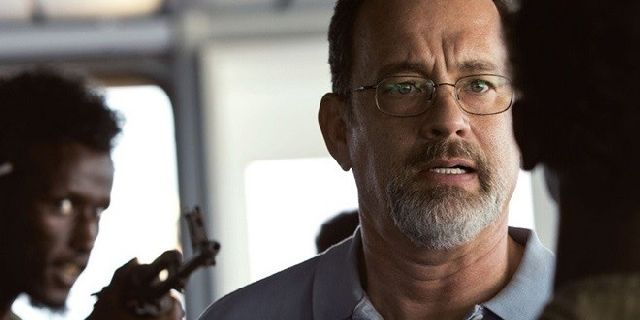Captain Phillips (2013) 
“Out here survival is everything”

Director: Paul Greengrass
Cast: Tom Hanks, Barkhad Abdi, Barkhad Abdirahman
Synopsis: The true story of Captain Richard Phillips and the 2009 hijacking by Somali pirates of the US-flagged MV Maersk Alabama, the first American cargo ship to be hijacked in two hundred years.
You get the impression from his attitude as he takes command of the Maersk Alabama freight ship that Captain Phillips (Tom Hanks — Toy Story, The Green Mile) senses that something unpleasant is about to happen on what should be a routine voyage through waters off the coast of Somalia. He’s unhappy with his crew’s relaxed attitude towards security, and their faintly startled reaction to his mild rebuke as they drink coffee suggests his abruptness is a little out of character. Phillips is a family man, as we’re succinctly informed in a brief couple of early scenes; he’s an ordinary man, in other words, about to be placed in an extraordinary situation.
Captain Phillips tells the story of the first pirate hijacking of an American vessel in 200 years and is a tale not so much of bravery as solid resolve in the face of unreasoning adversity. The pirates are Somalis operating under duress from a warlord who threaten the lives of them and their loved ones if they don’t carry out these hijackings to order. There’s big money — millions — to be made from these exploits, but those physically involved in the act itself earn very little. It’s a point made commendably early in the movie so that the Somali pirates aren’t demonised, despite the acts of violence they commit.
They’re led by the skeletal Muse (Barkhad Abdi), whose slender frame belies a strong survival instinct which sees him mercilessly overcome any challenge to his position. He chooses three others to accompany him, one of whom, Bilal (Barkhad Abdirahman), is chosen for the strength which eventually becomes a threat to his fellow pirates’ lives as their mission begins to unravel.
Watching the hijack unfold in Captain Phillips, we’re left shocked by the relative ease with which four ragged pirates in an ageing skiff can overpower a modern freighter like the Maersk Alabama, which was manned by a crew of 20. The trappings of civilisation leaves the Westerners at the mercy of the poor and uneducated Somali Pirates, even though these are not clever men; and the speed with which Phillips and his men acquiesce to the demands of the excitable, gun-toting Africans says much about the blinkered complacency of technologically advanced countries. These early scenes are filled with compelling layers of tension as Phillips first oversees futile attempts to prevent the pirates from boarding the freighter, and then to prevent them from finding the crewmen hiding in the engine room, and there’s a real sense of foreboding which writer Billy Ray somehow allows to simply evaporate in the movie’s second half.
Things take a turn for the worse for Phillips and the audience when the Somali pirates, foiled in their attempt to hijack the Maersk Alabama, kidnap him as they retreat into the safety of one of the freighter’s pod-like lifeboats and high-tail it back home. To be honest, it’s at this point, just as the tension should be taking a stranglehold on its audience that Captain Philips (the movie, not the man) begins to fall apart. Although director Paul Greengrass employs all the usual tricks, with his fly-on-the-wall camera filming extreme close-ups of the four sweaty men inside the pod to emphasise the claustrophobic tension, very little happens as the US marshal their Navy Seals (hurrah!) to give chase. The Somali pirates bicker endlessly – with both Phillips and one another – but little happens, so that instead of our tension growing, we incredibly begin to grow both bored and irritated by the whole situation.
As always with Hollywood movies based on fact, the veracity of events depicted on the screen is open to question – particularly when you take into consideration the fact that a number of the crew of the Maersk Alabama subsequently sued Maersk for deliberately endangering their lives. Apparently, the real Captain Phillips ignored his men’s pleas by deciding to sail well within the recommended 600-mile danger zone despite knowing the seas in the area were full of marauding pirates. That might explain the movie-Phillips’ subdued and slightly offish attitude at the film’s beginning – an implicit nod to his unintentional complicity in the fate that befell the ship and its crew. Overall, though, Captain Phillips appears to stick reasonably close to the facts, and it thankfully refrains from subjecting us to the full five day experience of Phillips in that lifeboat by compressing the action into a day and a half.
Even then, though, after starting so strongly Captain Phillips eventually deteriorates to become, if not an ordeal, then something of a chore. Hanks is as solid as you’d expect and manages the tricky task of keeping Phillips an emotionally remote character without losing audience sympathy for much of its running time, but even he flounders in that lifeless second half. His performance is matched – and overshadowed in many ways – by that of the newcomer Abdi who never once falls into the trap of overstating the unspoken desperation that fuels his criminal activities. His unique appearance might make Abdi difficult to cast in future – if he should get parts, criminal typecasting seems inevitable – but his performance in Captain Phillips suggests there are more good things to come from him.
httpv://www.youtube.com/watch?v=D36VztJ8oaQ
